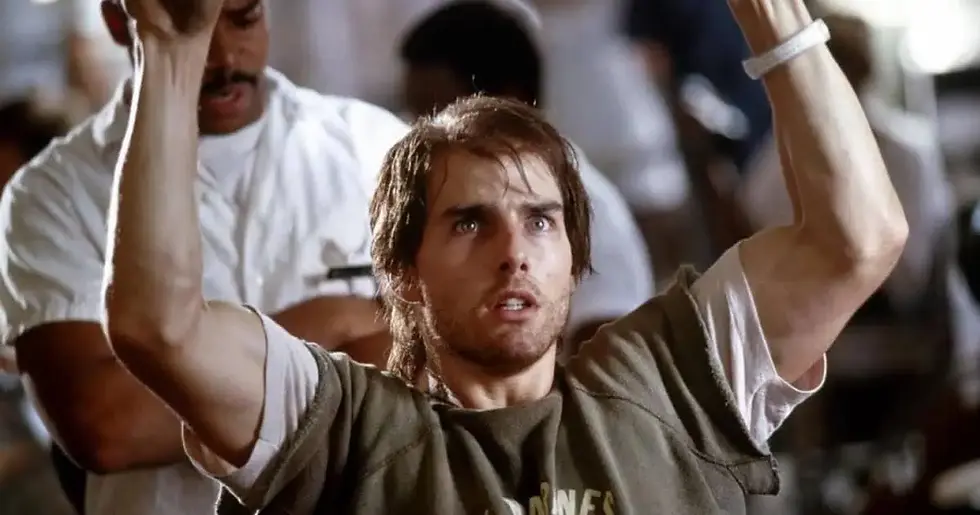Born on the Fourth of July (1989)
- Soames Inscker

- May 21, 2025
- 4 min read
Updated: Jun 8, 2025

Oliver Stone’s Born on the Fourth of July (1989) is a harrowing, deeply personal, and politically charged film that stands as one of the most powerful anti-war dramas in American cinema. Based on the autobiography of Vietnam War veteran Ron Kovic, the film charts his journey from patriotic zealot to paraplegic war hero turned radical activist. Anchored by a career-defining performance from Tom Cruise, the film is an emotional rollercoaster that lays bare the disillusionment and inner torment of an entire generation of American soldiers.
Plot Overview
The narrative follows Ron Kovic (Cruise), a working-class boy from Massapequa, New York, who grows up idolizing American ideals of freedom and duty. Enamoured by John F. Kennedy’s rhetoric and the mythology of World War II, Kovic enlists in the Marines, eager to prove himself and serve his country in Vietnam.

However, the brutality of the war quickly shatters his illusions. Kovic is critically wounded during his second tour and becomes paralyzed from the chest down. His return home is marked by a new battle—one against the Veterans Administration’s neglect, public indifference, and his own guilt and trauma. Through a painful metamorphosis, Kovic evolves from an all-American soldier to a vocal opponent of the war, eventually speaking at the 1972 Democratic National Convention.
Tom Cruise’s Transformative Performance

Born on the Fourth of July is widely regarded as a turning point in Tom Cruise’s career. Known primarily for his roles in lighter fare (Top Gun, Cocktail), Cruise took an audacious risk in portraying Ron Kovic. The result is a raw, committed, and emotionally complex performance. He captures Kovic’s youthful idealism, the soul-crushing despair of his injuries, and the firebrand intensity of his activism.
His physical transformation is impressive—Cruise is almost unrecognizable as the bearded, long-haired Kovic in the later scenes—but it’s the emotional depth that stands out. From scenes of gut-wrenching anguish in the VA hospital to impassioned confrontations with his conservative parents, Cruise inhabits the role with startling authenticity. It earned him his first Academy Award nomination and permanently altered public perception of his acting range.
Direction and Screenplay
Oliver Stone, himself a Vietnam veteran, brings personal urgency and fervour to the film. This is the second instalment in what became his Vietnam Trilogy, sandwiched between Platoon (1986) and Heaven & Earth (1993). While Platoon showed the horrors of the jungle, Born on the Fourth of July exposes the psychological and societal wounds left behind.
Stone’s direction is bold and often confrontational. The film moves fluidly between sweeping patriotic imagery and disturbing, often chaotic, depictions of violence and disillusionment. He contrasts Kovic’s small-town Americana upbringing with the moral decay of the war effort and the institutional failures that follow. The screenplay, co-written by Stone and Kovic, is both intimate and incendiary, weaving personal trauma with broader political commentary.
Cinematography and Score
Robert Richardson’s cinematography is both lyrical and unsparing. The bright, nostalgic glow of Ron’s childhood contrasts starkly with the grainy, frenetic visuals of combat and the bleak sterility of the VA hospitals. There’s a recurring visual motif of American flags—fluttering over parades, draped on coffins, and burned in protests—underscoring the central theme of betrayed patriotism.
John Williams’ musical score is among his most underrated works. It forgoes bombast in favour of mournful, elegiac themes, complementing the emotional undercurrents of the narrative. The haunting French horn leitmotif that recurs throughout the film adds depth to Kovic’s inner journey.
Themes and Impact

The film grapples with a number of potent themes: the seduction of nationalism, the cruelty of institutional indifference, the struggle for identity after trauma, and the power of dissent. It asks difficult questions about the cost of war—not just in lives lost, but in the psychological and moral toll it takes on soldiers.
Unlike many war films that focus on physical conflict, Born on the Fourth of July shines in depicting the war’s aftermath. It illustrates how the battlefield continues long after the fighting ends, especially for veterans whose bodies and spirits are shattered. Kovic’s story is one of profound personal reckoning, transformation, and redemption.
The film also resonates as a political statement. Released at the end of the Reagan era, it challenged the jingoistic narratives of American exceptionalism and reignited public discourse around Vietnam. Its empathetic portrayal of a disabled veteran also contributed to a broader awareness of the plight of wounded soldiers.
Reception and Legacy
Born on the Fourth of July received widespread critical acclaim. It won two Academy Awards—Best Director for Oliver Stone and Best Film Editing—and was nominated for six others, including Best Picture and Best Actor for Cruise. It also earned the Golden Globe for Best Motion Picture – Drama.
Today, it is widely regarded as one of the most important films about the Vietnam War and one of Oliver Stone’s greatest achievements. It remains essential viewing for its historical insight, emotional power, and unflinching honesty.
Conclusion
Born on the Fourth of July is not an easy film to watch, nor should it be. It confronts the viewer with the messy, painful reality behind patriotic slogans and military heroism. Through the lens of Ron Kovic’s life, Oliver Stone crafts a searing indictment of war and a poignant exploration of one man’s search for meaning and voice. With Tom Cruise’s blistering performance at its core, the film is a profound testament to the resilience of the human spirit—and the terrible cost of misguided idealism.






